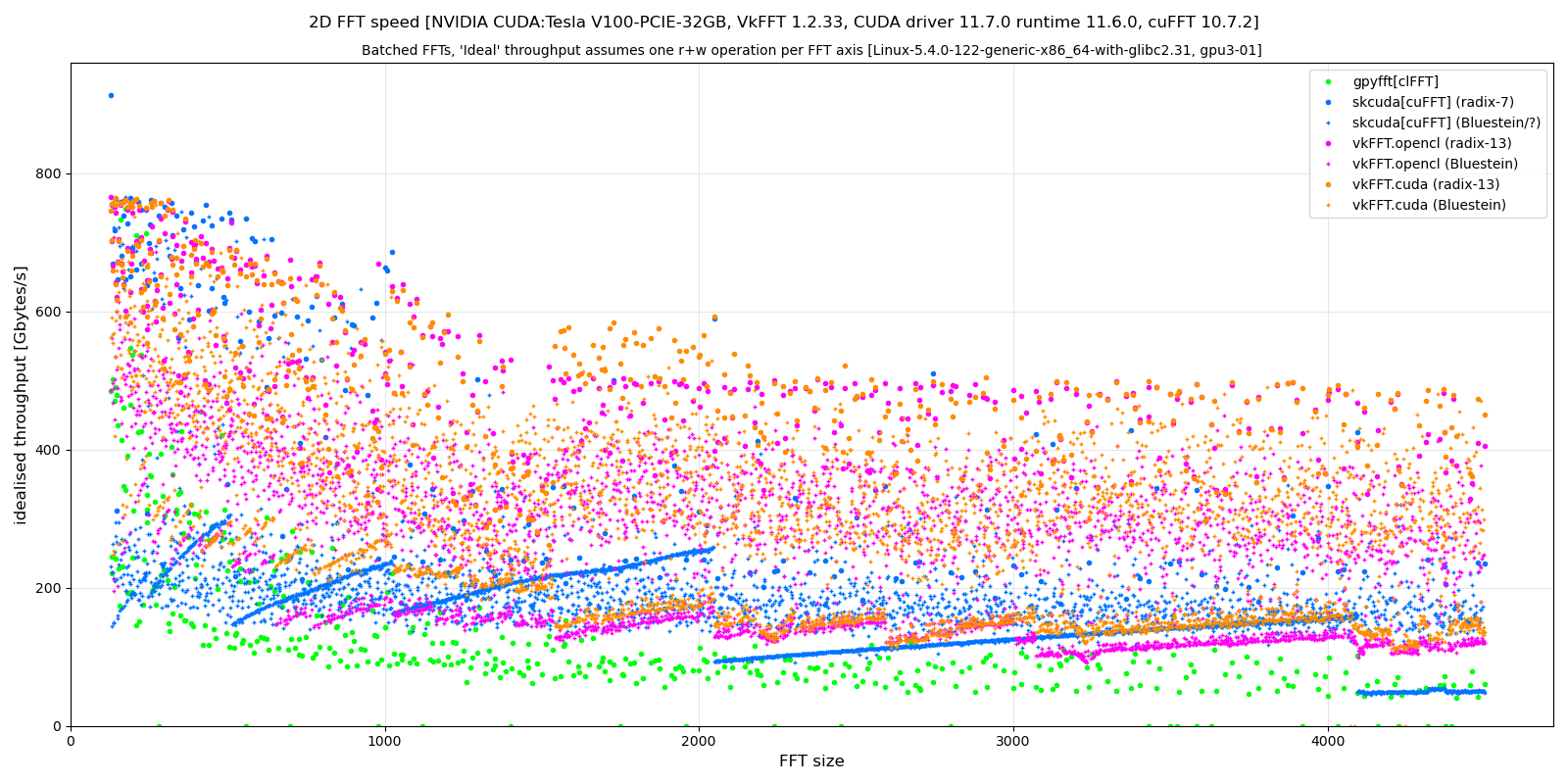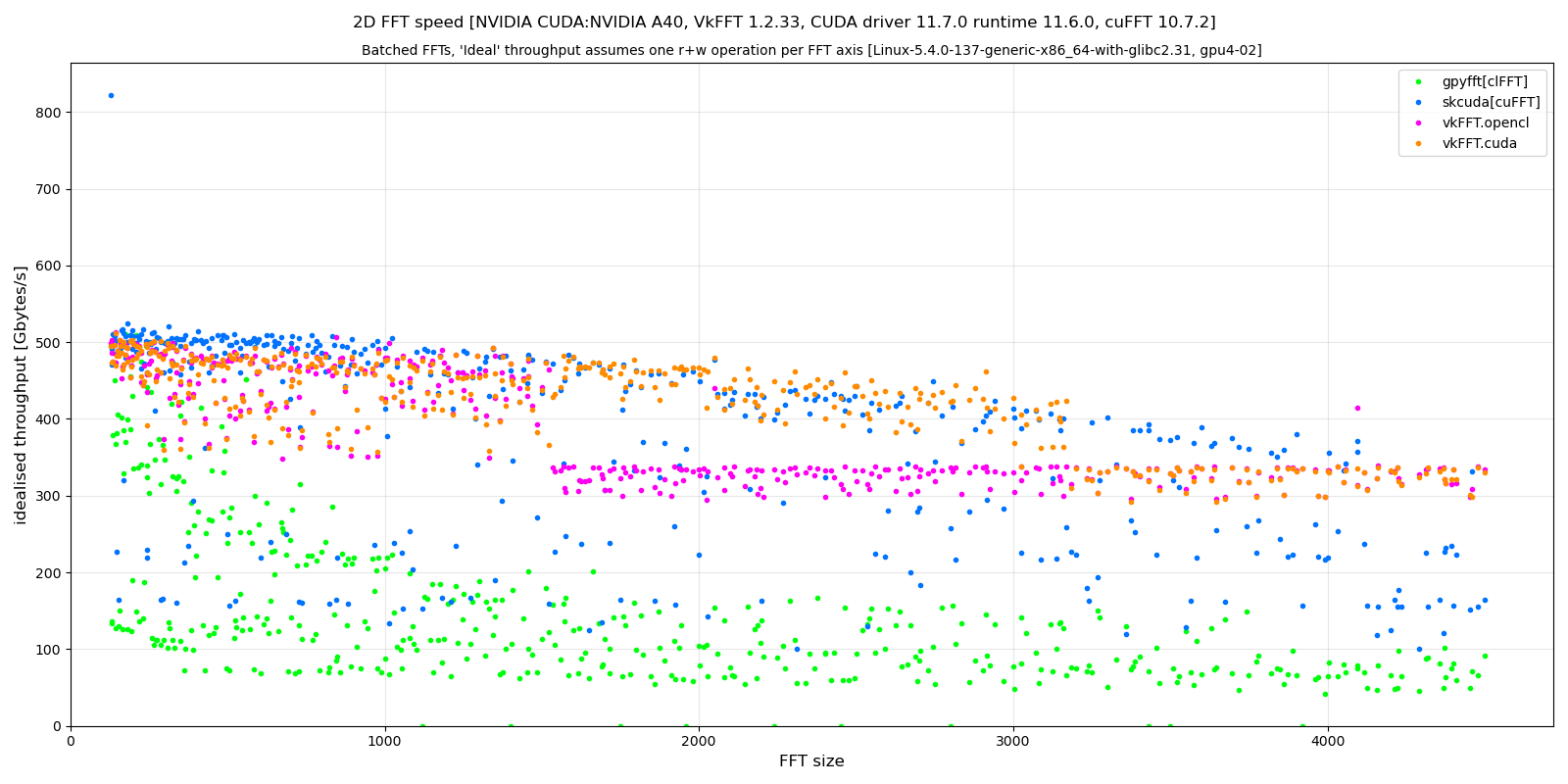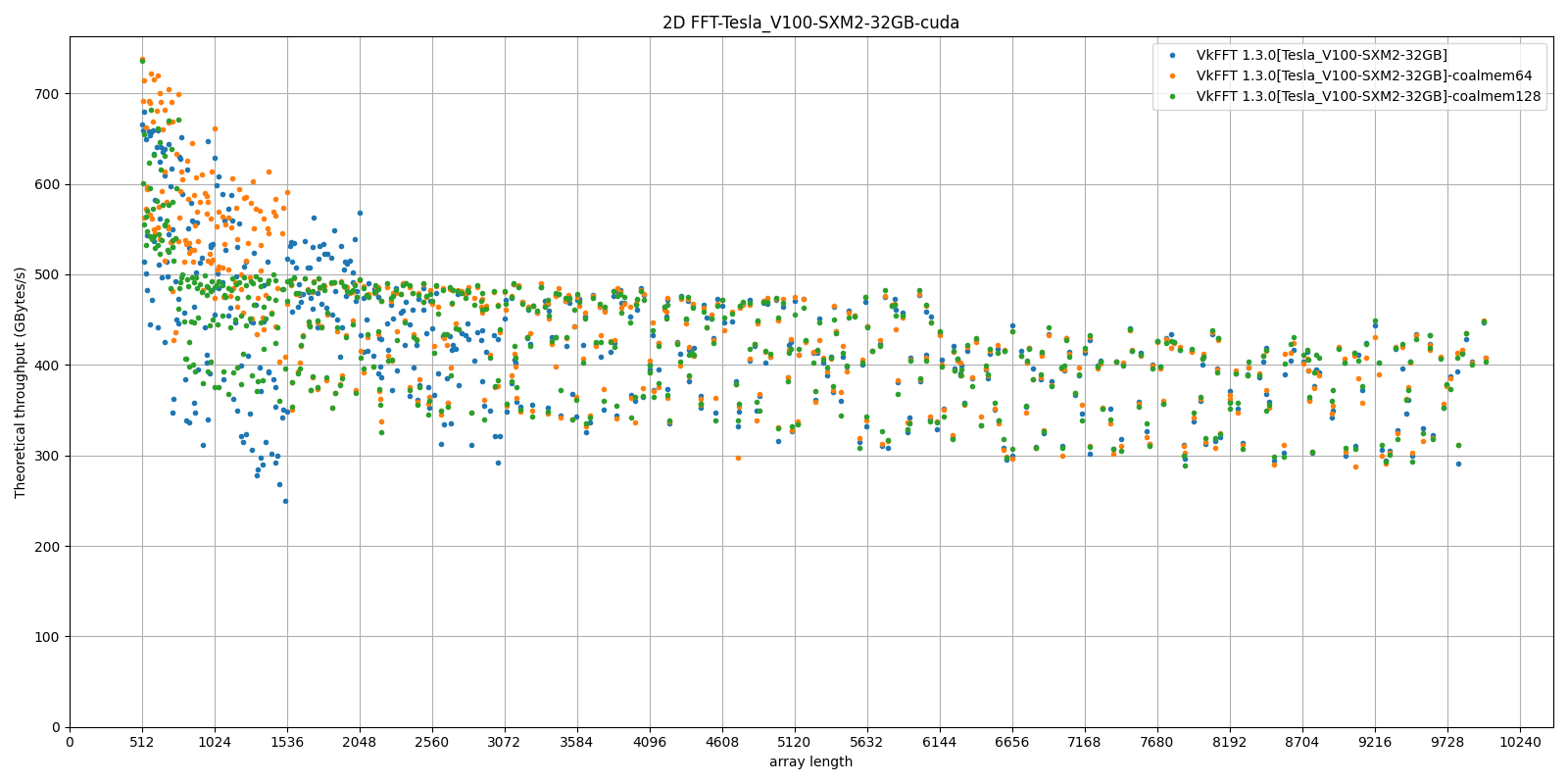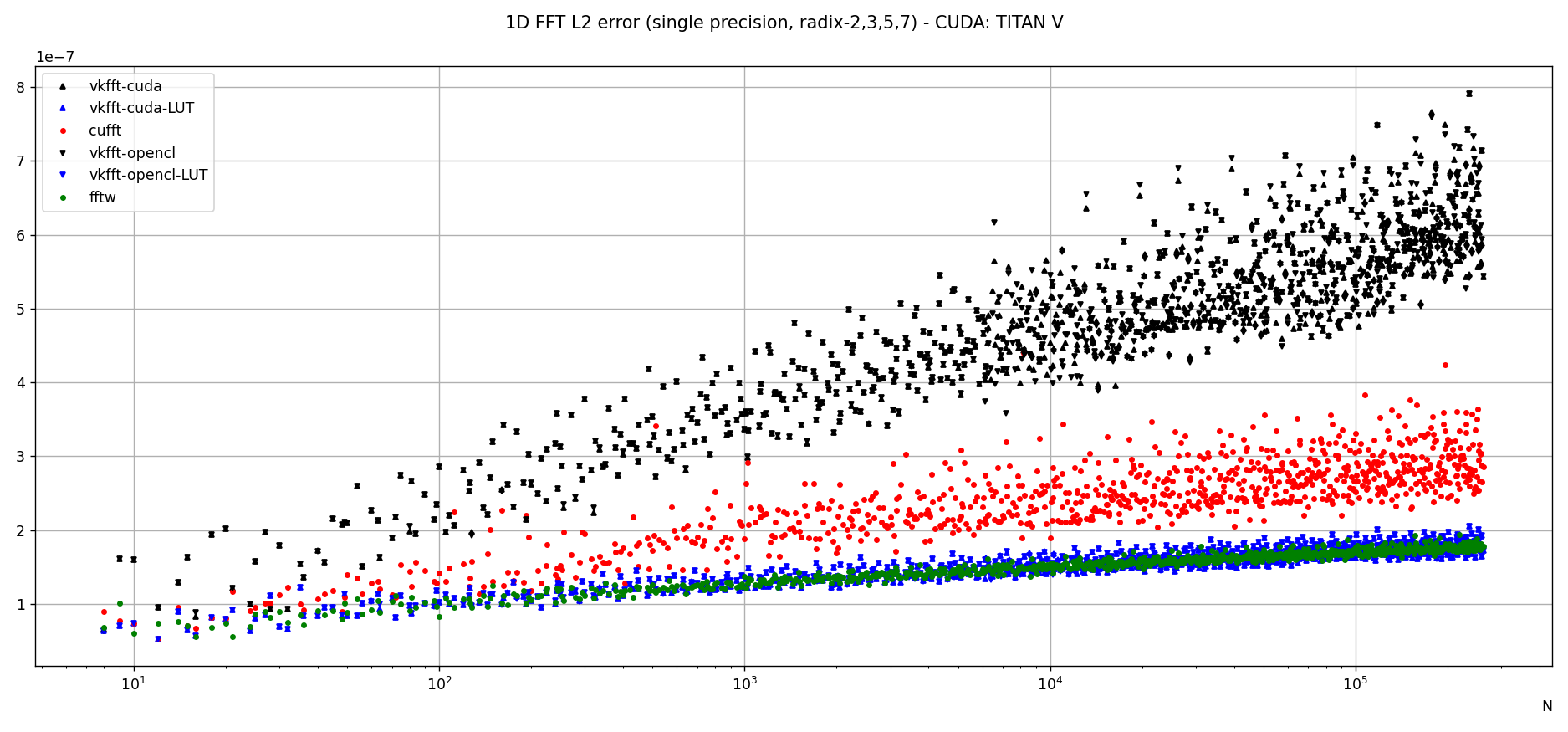pyopencl R2C (30+2) axes= None ndim= 1 float32 lut=None inplace=1 norm= 0 FFT: n2=1.09e-07 ninf=1.18e-07 < 2.74e-06 (0.043) 0 iFFT: n2=1.06e-07 ninf=1.28e-07 < 2.74e-06 (0.047) 0 OK
pyopencl R2C (30+2) axes= None ndim= 1 float32 lut=None inplace=1 norm= 1 FFT: n2=1.09e-07 ninf=1.18e-07 < 2.74e-06 (0.043) 0 iFFT: n2=9.92e-08 ninf=1.36e-07 < 2.74e-06 (0.049) 0 OK
pyopencl R2C (30,) axes= None ndim= 1 float32 lut=None inplace=0 norm= 0 FFT: n2=1.09e-07 ninf=1.18e-07 < 2.74e-06 (0.043) 1 iFFT: n2=1.06e-07 ninf=1.28e-07 < 2.74e-06 (0.047) 1 OK
pyopencl R2C (30,) axes= None ndim= 1 float32 lut=None inplace=0 norm= 1 FFT: n2=1.09e-07 ninf=1.18e-07 < 2.74e-06 (0.043) 1 iFFT: n2=9.92e-08 ninf=1.36e-07 < 2.74e-06 (0.049) 1 OK
pyopencl R2C (30+2) axes= None ndim= 1 float32 lut=True inplace=1 norm= 0 FFT: n2=8.12e-08 ninf=8.93e-08 < 2.74e-06 (0.033) 0 iFFT: n2=7.62e-08 ninf=7.70e-08 < 2.74e-06 (0.028) 0 OK
pyopencl R2C (30+2) axes= None ndim= 1 float32 lut=True inplace=1 norm= 1 FFT: n2=8.12e-08 ninf=8.93e-08 < 2.74e-06 (0.033) 0 iFFT: n2=1.31e-07 ninf=1.35e-07 < 2.74e-06 (0.049) 0 OK
pyopencl R2C (30,) axes= None ndim= 1 float32 lut=True inplace=0 norm= 0 FFT: n2=8.12e-08 ninf=8.93e-08 < 2.74e-06 (0.033) 1 iFFT: n2=7.62e-08 ninf=7.70e-08 < 2.74e-06 (0.028) 1 OK
pyopencl R2C (30,) axes= None ndim= 1 float32 lut=True inplace=0 norm= 1 FFT: n2=8.12e-08 ninf=8.93e-08 < 2.74e-06 (0.033) 1 iFFT: n2=1.31e-07 ninf=1.35e-07 < 2.74e-06 (0.049) 1 OK
pyopencl R2C (30+2) axes= None ndim= 1 float64 lut=None inplace=1 norm= 0 FFT: n2=2.93e-16 ninf=3.16e-16 < 5.74e-15 (0.055) 0 iFFT: n2=3.70e-16 ninf=4.57e-16 < 5.74e-15 (0.080) 0 OK
pyopencl R2C (30+2) axes= None ndim= 1 float64 lut=None inplace=1 norm= 1 FFT: n2=2.93e-16 ninf=3.16e-16 < 5.74e-15 (0.055) 0 iFFT: n2=2.13e-16 ninf=3.43e-16 < 5.74e-15 (0.060) 0 OK
pyopencl R2C (30,) axes= None ndim= 1 float64 lut=None inplace=0 norm= 0 FFT: n2=2.62e-16 ninf=3.16e-16 < 5.74e-15 (0.055) 1 iFFT: n2=2.61e-16 ninf=3.43e-16 < 5.74e-15 (0.060) 1 OK
pyopencl R2C (30,) axes= None ndim= 1 float64 lut=None inplace=0 norm= 1 FFT: n2=2.62e-16 ninf=3.16e-16 < 5.74e-15 (0.055) 1 iFFT: n2=2.63e-16 ninf=3.43e-16 < 5.74e-15 (0.060) 1 OK
pyopencl R2C (2,30+2) axes= None ndim= 1 float32 lut=None inplace=1 norm= 0 FFT: n2=1.37e-07 ninf=1.27e-07 < 2.74e-06 (0.047) 0 iFFT: n2=1.38e-07 ninf=2.24e-07 < 2.74e-06 (0.082) 0 OK
pyopencl R2C (2,30+2) axes= None ndim= 1 float32 lut=None inplace=1 norm= 1 FFT: n2=1.37e-07 ninf=1.27e-07 < 2.74e-06 (0.047) 0 iFFT: n2=1.22e-07 ninf=1.96e-07 < 2.74e-06 (0.071) 0 OK
pyopencl R2C (2,30) axes= None ndim= 1 float32 lut=None inplace=0 norm= 0 FFT: n2=1.37e-07 ninf=1.27e-07 < 2.74e-06 (0.047) 1 iFFT: n2=1.38e-07 ninf=2.24e-07 < 2.74e-06 (0.082) 1 OK
pyopencl R2C (2,30) axes= None ndim= 1 float32 lut=None inplace=0 norm= 1 FFT: n2=1.37e-07 ninf=1.27e-07 < 2.74e-06 (0.047) 1 iFFT: n2=1.22e-07 ninf=1.96e-07 < 2.74e-06 (0.071) 1 OK
pyopencl R2C (2,30+2) axes= None ndim= 1 float32 lut=True inplace=1 norm= 0 FFT: n2=8.20e-08 ninf=6.13e-08 < 2.74e-06 (0.022) 0 iFFT: n2=1.01e-07 ninf=1.30e-07 < 2.74e-06 (0.047) 0 OK
pyopencl R2C (2,30+2) axes= None ndim= 1 float32 lut=True inplace=1 norm= 1 FFT: n2=8.20e-08 ninf=6.13e-08 < 2.74e-06 (0.022) 0 iFFT: n2=1.32e-07 ninf=2.33e-07 < 2.74e-06 (0.085) 0 OK
pyopencl R2C (2,30) axes= None ndim= 1 float32 lut=True inplace=0 norm= 0 FFT: n2=8.20e-08 ninf=6.13e-08 < 2.74e-06 (0.022) 1 iFFT: n2=1.01e-07 ninf=1.30e-07 < 2.74e-06 (0.047) 1 OK
pyopencl R2C (2,30) axes= None ndim= 1 float32 lut=True inplace=0 norm= 1 FFT: n2=8.20e-08 ninf=6.13e-08 < 2.74e-06 (0.022) 1 iFFT: n2=1.32e-07 ninf=2.33e-07 < 2.74e-06 (0.085) 1 OK
pyopencl R2C (2,30+2) axes= None ndim= 1 float64 lut=None inplace=1 norm= 0 FFT: n2=2.25e-16 ninf=3.30e-16 < 5.74e-15 (0.057) 0 iFFT: n2=5.44e-16 ninf=7.78e-16 < 5.74e-15 (0.136) 0 OK
pyopencl R2C (2,30+2) axes= None ndim= 1 float64 lut=None inplace=1 norm= 1 FFT: n2=2.25e-16 ninf=3.30e-16 < 5.74e-15 (0.057) 0 iFFT: n2=2.97e-16 ninf=5.56e-16 < 5.74e-15 (0.097) 0 OK
pyopencl R2C (2,30) axes= None ndim= 1 float64 lut=None inplace=0 norm= 0 FFT: n2=2.30e-16 ninf=3.76e-16 < 5.74e-15 (0.066) 1 iFFT: n2=2.62e-16 ninf=4.45e-16 < 5.74e-15 (0.077) 1 OK
pyopencl R2C (2,30) axes= None ndim= 1 float64 lut=None inplace=0 norm= 1 FFT: n2=2.30e-16 ninf=3.76e-16 < 5.74e-15 (0.066) 1 iFFT: n2=2.76e-16 ninf=3.47e-16 < 5.74e-15 (0.061) 1 OK
pyopencl R2C (30,30) axes= None ndim= 2 float32 lut=None inplace=0 norm= 0 FFT: n2=1.79e-07 ninf=2.24e-07 < 3.48e-06 (0.064) 1 iFFT: n2=1.43e+00 ninf=2.52e+00 < 3.48e-06 (723527.389) 0 FAIL
pyopencl R2C (30,30) axes= None ndim= 2 float32 lut=None inplace=0 norm= 1 FFT: n2=1.79e-07 ninf=2.24e-07 < 3.48e-06 (0.064) 1 iFFT: n2=1.43e+00 ninf=2.52e+00 < 3.48e-06 (723527.355) 0 FAIL
pyopencl R2C (30,30) axes= None ndim= 2 float32 lut=True inplace=0 norm= 0 FFT: n2=1.43e-07 ninf=1.81e-07 < 3.48e-06 (0.052) 1 iFFT: n2=1.43e+00 ninf=2.52e+00 < 3.48e-06 (723527.423) 0 FAIL
pyopencl R2C (30,30) axes= None ndim= 2 float32 lut=True inplace=0 norm= 1 FFT: n2=1.43e-07 ninf=1.81e-07 < 3.48e-06 (0.052) 1 iFFT: n2=1.43e+00 ninf=2.52e+00 < 3.48e-06 (723527.423) 0 FAIL
pyopencl R2C (30,30) axes= None ndim= 2 float64 lut=None inplace=0 norm= 0 FFT: n2=3.85e-16 ninf=4.70e-16 < 6.48e-15 (0.073) 1 iFFT: n2=1.43e+00 ninf=2.38e+00 < 6.48e-15 (367908337750424.188) 0 FAIL
pyopencl R2C (30,30) axes= None ndim= 2 float64 lut=None inplace=0 norm= 1 FFT: n2=3.85e-16 ninf=4.70e-16 < 6.48e-15 (0.073) 1 iFFT: n2=1.43e+00 ninf=2.38e+00 < 6.48e-15 (367908337750424.188) 0 FAIL
pyopencl R2C (2,2,30+2) axes= None ndim= 1 float32 lut=None inplace=1 norm= 0 FFT: n2=1.45e-07 ninf=2.15e-07 < 2.74e-06 (0.078) 0 iFFT: n2=1.31e-07 ninf=2.21e-07 < 2.74e-06 (0.081) 0 OK
pyopencl R2C (2,2,30+2) axes= None ndim= 1 float32 lut=None inplace=1 norm= 1 FFT: n2=1.45e-07 ninf=2.15e-07 < 2.74e-06 (0.078) 0 iFFT: n2=1.43e-07 ninf=2.25e-07 < 2.74e-06 (0.082) 0 OK
pyopencl R2C (2,2,30) axes= None ndim= 1 float32 lut=None inplace=0 norm= 0 FFT: n2=1.45e-07 ninf=2.15e-07 < 2.74e-06 (0.078) 1 iFFT: n2=1.31e-07 ninf=2.21e-07 < 2.74e-06 (0.081) 1 OK
pyopencl R2C (2,2,30) axes= None ndim= 1 float32 lut=None inplace=0 norm= 1 FFT: n2=1.45e-07 ninf=2.15e-07 < 2.74e-06 (0.078) 1 iFFT: n2=1.43e-07 ninf=2.25e-07 < 2.74e-06 (0.082) 1 OK
pyopencl R2C (2,2,30+2) axes= None ndim= 1 float32 lut=True inplace=1 norm= 0 FFT: n2=1.01e-07 ninf=1.28e-07 < 2.74e-06 (0.047) 0 iFFT: n2=9.53e-08 ninf=1.23e-07 < 2.74e-06 (0.045) 0 OK
pyopencl R2C (2,2,30+2) axes= None ndim= 1 float32 lut=True inplace=1 norm= 1 FFT: n2=1.01e-07 ninf=1.28e-07 < 2.74e-06 (0.047) 0 iFFT: n2=1.37e-07 ninf=2.25e-07 < 2.74e-06 (0.082) 0 OK
pyopencl R2C (2,2,30) axes= None ndim= 1 float32 lut=True inplace=0 norm= 0 FFT: n2=1.01e-07 ninf=1.28e-07 < 2.74e-06 (0.047) 1 iFFT: n2=9.53e-08 ninf=1.23e-07 < 2.74e-06 (0.045) 1 OK
pyopencl R2C (2,2,30) axes= None ndim= 1 float32 lut=True inplace=0 norm= 1 FFT: n2=1.01e-07 ninf=1.28e-07 < 2.74e-06 (0.047) 1 iFFT: n2=1.37e-07 ninf=2.25e-07 < 2.74e-06 (0.082) 1 OK
pyopencl R2C (2,2,30+2) axes= None ndim= 1 float64 lut=None inplace=1 norm= 0 FFT: n2=2.88e-16 ninf=3.14e-16 < 5.74e-15 (0.055) 0 iFFT: n2=4.60e-16 ninf=8.94e-16 < 5.74e-15 (0.156) 0 OK
pyopencl R2C (2,2,30+2) axes= None ndim= 1 float64 lut=None inplace=1 norm= 1 FFT: n2=2.88e-16 ninf=3.14e-16 < 5.74e-15 (0.055) 0 iFFT: n2=2.65e-16 ninf=5.59e-16 < 5.74e-15 (0.097) 0 OK
pyopencl R2C (2,2,30) axes= None ndim= 1 float64 lut=None inplace=0 norm= 0 FFT: n2=2.82e-16 ninf=3.14e-16 < 5.74e-15 (0.055) 1 iFFT: n2=2.87e-16 ninf=4.75e-16 < 5.74e-15 (0.083) 1 OK
pyopencl R2C (2,2,30) axes= None ndim= 1 float64 lut=None inplace=0 norm= 1 FFT: n2=2.82e-16 ninf=3.14e-16 < 5.74e-15 (0.055) 1 iFFT: n2=2.72e-16 ninf=3.91e-16 < 5.74e-15 (0.068) 1 OK
pyopencl R2C (2,2,2,30+2) axes= None ndim= 1 float32 lut=None inplace=1 norm= 0 FFT: n2=1.53e-07 ninf=2.01e-07 < 2.74e-06 (0.073) 0 iFFT: n2=1.43e-07 ninf=3.13e-07 < 2.74e-06 (0.114) 0 OK
pyopencl R2C (2,2,2,30+2) axes= None ndim= 1 float32 lut=None inplace=1 norm= 1 FFT: n2=1.53e-07 ninf=2.01e-07 < 2.74e-06 (0.073) 0 iFFT: n2=1.48e-07 ninf=2.80e-07 < 2.74e-06 (0.102) 0 OK
pyopencl R2C (2,2,2,30) axes= None ndim= 1 float32 lut=None inplace=0 norm= 0 FFT: n2=1.53e-07 ninf=2.01e-07 < 2.74e-06 (0.073) 1 iFFT: n2=1.43e-07 ninf=3.13e-07 < 2.74e-06 (0.114) 1 OK
pyopencl R2C (2,2,2,30) axes= None ndim= 1 float32 lut=None inplace=0 norm= 1 FFT: n2=1.53e-07 ninf=2.01e-07 < 2.74e-06 (0.073) 1 iFFT: n2=1.48e-07 ninf=2.80e-07 < 2.74e-06 (0.102) 1 OK
pyopencl R2C (2,2,2,30+2) axes= None ndim= 1 float32 lut=True inplace=1 norm= 0 FFT: n2=1.01e-07 ninf=1.18e-07 < 2.74e-06 (0.043) 0 iFFT: n2=1.08e-07 ninf=2.20e-07 < 2.74e-06 (0.080) 0 OK
pyopencl R2C (2,2,2,30+2) axes= None ndim= 1 float32 lut=True inplace=1 norm= 1 FFT: n2=1.01e-07 ninf=1.18e-07 < 2.74e-06 (0.043) 0 iFFT: n2=1.37e-07 ninf=1.94e-07 < 2.74e-06 (0.071) 0 OK
pyopencl R2C (2,2,2,30) axes= None ndim= 1 float32 lut=True inplace=0 norm= 0 FFT: n2=1.01e-07 ninf=1.18e-07 < 2.74e-06 (0.043) 1 iFFT: n2=1.08e-07 ninf=2.20e-07 < 2.74e-06 (0.080) 1 OK
pyopencl R2C (2,2,2,30) axes= None ndim= 1 float32 lut=True inplace=0 norm= 1 FFT: n2=1.01e-07 ninf=1.18e-07 < 2.74e-06 (0.043) 1 iFFT: n2=1.37e-07 ninf=1.94e-07 < 2.74e-06 (0.071) 1 OK
pyopencl R2C (2,2,2,30+2) axes= None ndim= 1 float64 lut=None inplace=1 norm= 0 FFT: n2=2.89e-16 ninf=3.35e-16 < 5.74e-15 (0.058) 0 iFFT: n2=4.58e-16 ninf=7.84e-16 < 5.74e-15 (0.137) 0 OK
pyopencl R2C (2,2,2,30+2) axes= None ndim= 1 float64 lut=None inplace=1 norm= 1 FFT: n2=2.89e-16 ninf=3.35e-16 < 5.74e-15 (0.058) 0 iFFT: n2=3.03e-16 ninf=5.60e-16 < 5.74e-15 (0.098) 0 OK
pyopencl R2C (2,2,2,30) axes= None ndim= 1 float64 lut=None inplace=0 norm= 0 FFT: n2=2.92e-16 ninf=3.35e-16 < 5.74e-15 (0.058) 1 iFFT: n2=3.06e-16 ninf=6.72e-16 < 5.74e-15 (0.117) 1 OK
pyopencl R2C (2,2,2,30) axes= None ndim= 1 float64 lut=None inplace=0 norm= 1 FFT: n2=2.92e-16 ninf=3.35e-16 < 5.74e-15 (0.058) 1 iFFT: n2=3.27e-16 ninf=5.60e-16 < 5.74e-15 (0.098) 1 OK
pyopencl R2C (34+2) axes= None ndim= 1 float32 lut=None inplace=1 norm= 0 FFT: n2=1.92e-07 ninf=1.58e-07 < 2.77e-06 (0.057) 0 iFFT: n2=1.88e-07 ninf=2.73e-07 < 2.77e-06 (0.099) 0 OK
pyopencl R2C (34+2) axes= None ndim= 1 float32 lut=None inplace=1 norm= 1 FFT: n2=1.92e-07 ninf=1.58e-07 < 2.77e-06 (0.057) 0 iFFT: n2=1.72e-07 ninf=2.00e-07 < 2.77e-06 (0.072) 0 OK
pyopencl R2C (34,) axes= None ndim= 1 float32 lut=None inplace=0 norm= 0 FFT: n2=1.92e-07 ninf=1.58e-07 < 5.53e-06 (0.028) 1 iFFT: n2=1.88e-07 ninf=2.73e-07 < 5.53e-06 (0.049) 1 OK
pyopencl R2C (34,) axes= None ndim= 1 float32 lut=None inplace=0 norm= 1 FFT: n2=1.92e-07 ninf=1.58e-07 < 5.53e-06 (0.028) 1 iFFT: n2=1.72e-07 ninf=2.00e-07 < 5.53e-06 (0.036) 1 OK
pyopencl R2C (34+2) axes= None ndim= 1 float32 lut=True inplace=1 norm= 0 FFT: n2=1.86e-07 ninf=1.78e-07 < 2.77e-06 (0.064) 0 iFFT: n2=1.64e-07 ninf=2.63e-07 < 2.77e-06 (0.095) 0 OK
pyopencl R2C (34+2) axes= None ndim= 1 float32 lut=True inplace=1 norm= 1 FFT: n2=1.86e-07 ninf=1.78e-07 < 2.77e-06 (0.064) 0 iFFT: n2=1.71e-07 ninf=2.59e-07 < 2.77e-06 (0.094) 0 OK
pyopencl R2C (34,) axes= None ndim= 1 float32 lut=True inplace=0 norm= 0 FFT: n2=1.86e-07 ninf=1.78e-07 < 5.53e-06 (0.032) 1 iFFT: n2=1.64e-07 ninf=2.63e-07 < 5.53e-06 (0.047) 1 OK
pyopencl R2C (34,) axes= None ndim= 1 float32 lut=True inplace=0 norm= 1 FFT: n2=1.86e-07 ninf=1.78e-07 < 5.53e-06 (0.032) 1 iFFT: n2=1.71e-07 ninf=2.59e-07 < 5.53e-06 (0.047) 1 OK
pyopencl R2C (34+2) axes= None ndim= 1 float64 lut=None inplace=1 norm= 0 FFT: n2=6.19e-16 ninf=7.44e-16 < 5.77e-15 (0.129) 0 iFFT: n2=3.26e-16 ninf=3.41e-16 < 5.77e-15 (0.059) 0 OK
pyopencl R2C (34+2) axes= None ndim= 1 float64 lut=None inplace=1 norm= 1 FFT: n2=6.19e-16 ninf=7.44e-16 < 5.77e-15 (0.129) 0 iFFT: n2=3.07e-16 ninf=4.55e-16 < 5.77e-15 (0.079) 0 OK
pyopencl R2C (34,) axes= None ndim= 1 float64 lut=None inplace=0 norm= 0 FFT: n2=6.19e-16 ninf=7.44e-16 < 1.15e-14 (0.064) 1 iFFT: n2=3.26e-16 ninf=3.41e-16 < 1.15e-14 (0.030) 1 OK
pyopencl R2C (34,) axes= None ndim= 1 float64 lut=None inplace=0 norm= 1 FFT: n2=6.19e-16 ninf=7.44e-16 < 1.15e-14 (0.064) 1 iFFT: n2=3.07e-16 ninf=4.55e-16 < 1.15e-14 (0.039) 1 OK
pyopencl R2C (2,34+2) axes= None ndim= 1 float32 lut=None inplace=1 norm= 0 FFT: n2=1.66e-07 ninf=1.91e-07 < 2.77e-06 (0.069) 0 iFFT: n2=2.20e-07 ninf=2.82e-07 < 2.77e-06 (0.102) 0 OK
pyopencl R2C (2,34+2) axes= None ndim= 1 float32 lut=None inplace=1 norm= 1 FFT: n2=1.66e-07 ninf=1.91e-07 < 2.77e-06 (0.069) 0 iFFT: n2=2.38e-07 ninf=3.21e-07 < 2.77e-06 (0.116) 0 OK
pyopencl R2C (2,34) axes= None ndim= 1 float32 lut=None inplace=0 norm= 0 FFT: n2=1.66e-07 ninf=1.91e-07 < 5.53e-06 (0.035) 1 iFFT: n2=2.20e-07 ninf=2.82e-07 < 5.53e-06 (0.051) 1 OK
pyopencl R2C (2,34) axes= None ndim= 1 float32 lut=None inplace=0 norm= 1 FFT: n2=1.66e-07 ninf=1.91e-07 < 5.53e-06 (0.035) 1 iFFT: n2=2.38e-07 ninf=3.21e-07 < 5.53e-06 (0.058) 1 OK
pyopencl R2C (2,34+2) axes= None ndim= 1 float32 lut=True inplace=1 norm= 0 FFT: n2=1.94e-07 ninf=2.01e-07 < 2.77e-06 (0.073) 0 iFFT: n2=2.05e-07 ninf=2.96e-07 < 2.77e-06 (0.107) 0 OK
pyopencl R2C (2,34+2) axes= None ndim= 1 float32 lut=True inplace=1 norm= 1 FFT: n2=1.94e-07 ninf=2.01e-07 < 2.77e-06 (0.073) 0 iFFT: n2=2.16e-07 ninf=3.21e-07 < 2.77e-06 (0.116) 0 OK
pyopencl R2C (2,34) axes= None ndim= 1 float32 lut=True inplace=0 norm= 0 FFT: n2=1.94e-07 ninf=2.01e-07 < 5.53e-06 (0.036) 1 iFFT: n2=2.05e-07 ninf=2.96e-07 < 5.53e-06 (0.054) 1 OK
pyopencl R2C (2,34) axes= None ndim= 1 float32 lut=True inplace=0 norm= 1 FFT: n2=1.94e-07 ninf=2.01e-07 < 5.53e-06 (0.036) 1 iFFT: n2=2.16e-07 ninf=3.21e-07 < 5.53e-06 (0.058) 1 OK
pyopencl R2C (2,34+2) axes= None ndim= 1 float64 lut=None inplace=1 norm= 0 FFT: n2=4.90e-16 ninf=5.49e-16 < 5.77e-15 (0.095) 0 iFFT: n2=5.86e-16 ninf=8.89e-16 < 5.77e-15 (0.154) 0 OK
pyopencl R2C (2,34+2) axes= None ndim= 1 float64 lut=None inplace=1 norm= 1 FFT: n2=4.90e-16 ninf=5.49e-16 < 5.77e-15 (0.095) 0 iFFT: n2=5.30e-16 ninf=8.89e-16 < 5.77e-15 (0.154) 0 OK
pyopencl R2C (2,34) axes= None ndim= 1 float64 lut=None inplace=0 norm= 0 FFT: n2=4.90e-16 ninf=5.49e-16 < 1.15e-14 (0.048) 1 iFFT: n2=5.86e-16 ninf=8.89e-16 < 1.15e-14 (0.077) 1 OK
pyopencl R2C (2,34) axes= None ndim= 1 float64 lut=None inplace=0 norm= 1 FFT: n2=4.90e-16 ninf=5.49e-16 < 1.15e-14 (0.048) 1 iFFT: n2=5.30e-16 ninf=8.89e-16 < 1.15e-14 (0.077) 1 OK
pyopencl R2C (34,34) axes= None ndim= 2 float32 lut=None inplace=0 norm= 0 FFT: n2=3.16e-07 ninf=3.05e-07 < 7.06e-06 (0.043) 1 iFFT: n2=1.39e+00 ninf=2.70e+00 < 7.06e-06 (382709.503) 0 FAIL
pyopencl R2C (34,34) axes= None ndim= 2 float32 lut=None inplace=0 norm= 1 FFT: n2=3.16e-07 ninf=3.05e-07 < 7.06e-06 (0.043) 1 iFFT: n2=1.39e+00 ninf=2.70e+00 < 7.06e-06 (382709.486) 0 FAIL
pyopencl R2C (34,34) axes= None ndim= 2 float32 lut=True inplace=0 norm= 0 FFT: n2=3.04e-07 ninf=3.78e-07 < 7.06e-06 (0.053) 1 iFFT: n2=1.39e+00 ninf=2.70e+00 < 7.06e-06 (382709.503) 0 FAIL
pyopencl R2C (34,34) axes= None ndim= 2 float32 lut=True inplace=0 norm= 1 FFT: n2=3.04e-07 ninf=3.78e-07 < 7.06e-06 (0.053) 1 iFFT: n2=1.39e+00 ninf=2.70e+00 < 7.06e-06 (382709.469) 0 FAIL
pyopencl R2C (34,34) axes= None ndim= 2 float64 lut=None inplace=0 norm= 0 FFT: n2=7.93e-16 ninf=1.04e-15 < 1.31e-14 (0.080) 1 iFFT: n2=1.43e+00 ninf=2.78e+00 < 1.31e-14 (212602327789630.625) 0 FAIL
pyopencl R2C (34,34) axes= None ndim= 2 float64 lut=None inplace=0 norm= 1 FFT: n2=7.93e-16 ninf=1.04e-15 < 1.31e-14 (0.080) 1 iFFT: n2=1.43e+00 ninf=2.78e+00 < 1.31e-14 (212602327789630.625) 0 FAIL
pyopencl R2C (2,2,34+2) axes= None ndim= 1 float32 lut=None inplace=1 norm= 0 FFT: n2=2.07e-07 ninf=2.35e-07 < 2.77e-06 (0.085) 0 iFFT: n2=2.13e-07 ninf=2.84e-07 < 2.77e-06 (0.103) 0 OK
pyopencl R2C (2,2,34+2) axes= None ndim= 1 float32 lut=None inplace=1 norm= 1 FFT: n2=2.07e-07 ninf=2.35e-07 < 2.77e-06 (0.085) 0 iFFT: n2=2.30e-07 ninf=3.37e-07 < 2.77e-06 (0.122) 0 OK
pyopencl R2C (2,2,34) axes= None ndim= 1 float32 lut=None inplace=0 norm= 0 FFT: n2=2.07e-07 ninf=2.35e-07 < 5.53e-06 (0.042) 1 iFFT: n2=2.13e-07 ninf=2.84e-07 < 5.53e-06 (0.051) 1 OK
pyopencl R2C (2,2,34) axes= None ndim= 1 float32 lut=None inplace=0 norm= 1 FFT: n2=2.07e-07 ninf=2.35e-07 < 5.53e-06 (0.042) 1 iFFT: n2=2.30e-07 ninf=3.37e-07 < 5.53e-06 (0.061) 1 OK
pyopencl R2C (2,2,34+2) axes= None ndim= 1 float32 lut=True inplace=1 norm= 0 FFT: n2=2.07e-07 ninf=2.72e-07 < 2.77e-06 (0.098) 0 iFFT: n2=2.05e-07 ninf=3.36e-07 < 2.77e-06 (0.121) 0 OK
pyopencl R2C (2,2,34+2) axes= None ndim= 1 float32 lut=True inplace=1 norm= 1 FFT: n2=2.07e-07 ninf=2.72e-07 < 2.77e-06 (0.098) 0 iFFT: n2=2.00e-07 ninf=3.03e-07 < 2.77e-06 (0.110) 0 OK
pyopencl R2C (2,2,34) axes= None ndim= 1 float32 lut=True inplace=0 norm= 0 FFT: n2=2.07e-07 ninf=2.72e-07 < 5.53e-06 (0.049) 1 iFFT: n2=2.05e-07 ninf=3.36e-07 < 5.53e-06 (0.061) 1 OK
pyopencl R2C (2,2,34) axes= None ndim= 1 float32 lut=True inplace=0 norm= 1 FFT: n2=2.07e-07 ninf=2.72e-07 < 5.53e-06 (0.049) 1 iFFT: n2=2.00e-07 ninf=3.03e-07 < 5.53e-06 (0.055) 1 OK
pyopencl R2C (2,2,34+2) axes= None ndim= 1 float64 lut=None inplace=1 norm= 0 FFT: n2=5.30e-16 ninf=7.55e-16 < 5.77e-15 (0.131) 0 iFFT: n2=5.41e-16 ninf=1.23e-15 < 5.77e-15 (0.213) 0 OK
pyopencl R2C (2,2,34+2) axes= None ndim= 1 float64 lut=None inplace=1 norm= 1 FFT: n2=5.30e-16 ninf=7.55e-16 < 5.77e-15 (0.131) 0 iFFT: n2=5.55e-16 ninf=1.00e-15 < 5.77e-15 (0.174) 0 OK
pyopencl R2C (2,2,34) axes= None ndim= 1 float64 lut=None inplace=0 norm= 0 FFT: n2=5.30e-16 ninf=7.55e-16 < 1.15e-14 (0.065) 1 iFFT: n2=5.41e-16 ninf=1.23e-15 < 1.15e-14 (0.106) 1 OK
pyopencl R2C (2,2,34) axes= None ndim= 1 float64 lut=None inplace=0 norm= 1 FFT: n2=5.30e-16 ninf=7.55e-16 < 1.15e-14 (0.065) 1 iFFT: n2=5.55e-16 ninf=1.00e-15 < 1.15e-14 (0.087) 1 OK
pyopencl R2C (2,2,2,34+2) axes= None ndim= 1 float32 lut=None inplace=1 norm= 0 FFT: n2=2.13e-07 ninf=2.43e-07 < 2.77e-06 (0.088) 0 iFFT: n2=1.96e-07 ninf=3.26e-07 < 2.77e-06 (0.118) 0 OK
pyopencl R2C (2,2,2,34+2) axes= None ndim= 1 float32 lut=None inplace=1 norm= 1 FFT: n2=2.13e-07 ninf=2.43e-07 < 2.77e-06 (0.088) 0 iFFT: n2=2.07e-07 ninf=3.64e-07 < 2.77e-06 (0.132) 0 OK
pyopencl R2C (2,2,2,34) axes= None ndim= 1 float32 lut=None inplace=0 norm= 0 FFT: n2=2.13e-07 ninf=2.43e-07 < 5.53e-06 (0.044) 1 iFFT: n2=1.96e-07 ninf=3.26e-07 < 5.53e-06 (0.059) 1 OK
pyopencl R2C (2,2,2,34) axes= None ndim= 1 float32 lut=None inplace=0 norm= 1 FFT: n2=2.13e-07 ninf=2.43e-07 < 5.53e-06 (0.044) 1 iFFT: n2=2.07e-07 ninf=3.64e-07 < 5.53e-06 (0.066) 1 OK
pyopencl R2C (2,2,2,34+2) axes= None ndim= 1 float32 lut=True inplace=1 norm= 0 FFT: n2=2.07e-07 ninf=2.33e-07 < 2.77e-06 (0.084) 0 iFFT: n2=1.75e-07 ninf=3.26e-07 < 2.77e-06 (0.118) 0 OK
pyopencl R2C (2,2,2,34+2) axes= None ndim= 1 float32 lut=True inplace=1 norm= 1 FFT: n2=2.07e-07 ninf=2.33e-07 < 2.77e-06 (0.084) 0 iFFT: n2=1.95e-07 ninf=3.33e-07 < 2.77e-06 (0.120) 0 OK
pyopencl R2C (2,2,2,34) axes= None ndim= 1 float32 lut=True inplace=0 norm= 0 FFT: n2=2.07e-07 ninf=2.33e-07 < 5.53e-06 (0.042) 1 iFFT: n2=1.75e-07 ninf=3.26e-07 < 5.53e-06 (0.059) 1 OK
pyopencl R2C (2,2,2,34) axes= None ndim= 1 float32 lut=True inplace=0 norm= 1 FFT: n2=2.07e-07 ninf=2.33e-07 < 5.53e-06 (0.042) 1 iFFT: n2=1.95e-07 ninf=3.33e-07 < 5.53e-06 (0.060) 1 OK
pyopencl R2C (2,2,2,34+2) axes= None ndim= 1 float64 lut=None inplace=1 norm= 0 FFT: n2=5.78e-16 ninf=1.12e-15 < 5.77e-15 (0.194) 0 iFFT: n2=5.78e-16 ninf=9.91e-16 < 5.77e-15 (0.172) 0 OK
pyopencl R2C (2,2,2,34+2) axes= None ndim= 1 float64 lut=None inplace=1 norm= 1 FFT: n2=5.78e-16 ninf=1.12e-15 < 5.77e-15 (0.194) 0 iFFT: n2=5.63e-16 ninf=1.07e-15 < 5.77e-15 (0.186) 0 OK
pyopencl R2C (2,2,2,34) axes= None ndim= 1 float64 lut=None inplace=0 norm= 0 FFT: n2=5.78e-16 ninf=1.12e-15 < 1.15e-14 (0.097) 1 iFFT: n2=5.78e-16 ninf=9.91e-16 < 1.15e-14 (0.086) 1 OK
pyopencl R2C (2,2,2,34) axes= None ndim= 1 float64 lut=None inplace=0 norm= 1 FFT: n2=5.78e-16 ninf=1.12e-15 < 1.15e-14 (0.097) 1 iFFT: n2=5.63e-16 ninf=1.07e-15 < 1.15e-14 (0.093) 1 OK
pyopencl R2C (808+2) axes= None ndim= 1 float32 lut=None inplace=1 norm= 0 FFT: n2=3.52e-07 ninf=3.76e-07 < 3.45e-06 (0.109) 0 iFFT: n2=3.05e-07 ninf=4.77e-07 < 3.45e-06 (0.138) 0 OK
pyopencl R2C (808+2) axes= None ndim= 1 float32 lut=None inplace=1 norm= 1 FFT: n2=3.52e-07 ninf=3.76e-07 < 3.45e-06 (0.109) 0 iFFT: n2=2.99e-07 ninf=5.14e-07 < 3.45e-06 (0.149) 0 OK
pyopencl R2C (808,) axes= None ndim= 1 float32 lut=None inplace=0 norm= 0 FFT: n2=3.52e-07 ninf=3.76e-07 < 6.91e-06 (0.054) 1 iFFT: n2=3.05e-07 ninf=4.77e-07 < 6.91e-06 (0.069) 1 OK
pyopencl R2C (808,) axes= None ndim= 1 float32 lut=None inplace=0 norm= 1 FFT: n2=3.52e-07 ninf=3.76e-07 < 6.91e-06 (0.054) 1 iFFT: n2=2.99e-07 ninf=5.14e-07 < 6.91e-06 (0.074) 1 OK
pyopencl R2C (808+2) axes= None ndim= 1 float32 lut=True inplace=1 norm= 0 FFT: n2=2.46e-07 ninf=2.57e-07 < 3.45e-06 (0.074) 0 iFFT: n2=2.01e-07 ninf=4.55e-07 < 3.45e-06 (0.132) 0 OK
pyopencl R2C (808+2) axes= None ndim= 1 float32 lut=True inplace=1 norm= 1 FFT: n2=2.46e-07 ninf=2.57e-07 < 3.45e-06 (0.074) 0 iFFT: n2=1.93e-07 ninf=4.09e-07 < 3.45e-06 (0.119) 0 OK
pyopencl R2C (808,) axes= None ndim= 1 float32 lut=True inplace=0 norm= 0 FFT: n2=2.46e-07 ninf=2.57e-07 < 6.91e-06 (0.037) 1 iFFT: n2=2.01e-07 ninf=4.55e-07 < 6.91e-06 (0.066) 1 OK
pyopencl R2C (808,) axes= None ndim= 1 float32 lut=True inplace=0 norm= 1 FFT: n2=2.46e-07 ninf=2.57e-07 < 6.91e-06 (0.037) 1 iFFT: n2=1.93e-07 ninf=4.09e-07 < 6.91e-06 (0.059) 1 OK
pyopencl R2C (808+2) axes= None ndim= 1 float64 lut=None inplace=1 norm= 0 FFT: n2=7.58e-16 ninf=1.00e-15 < 6.45e-15 (0.155) 0 iFFT: n2=4.26e-16 ninf=8.89e-16 < 6.45e-15 (0.138) 0 OK
pyopencl R2C (808+2) axes= None ndim= 1 float64 lut=None inplace=1 norm= 1 FFT: n2=7.58e-16 ninf=1.00e-15 < 6.45e-15 (0.155) 0 iFFT: n2=5.06e-16 ninf=1.11e-15 < 6.45e-15 (0.172) 0 OK
pyopencl R2C (808,) axes= None ndim= 1 float64 lut=None inplace=0 norm= 0 FFT: n2=7.58e-16 ninf=1.00e-15 < 1.29e-14 (0.078) 1 iFFT: n2=4.26e-16 ninf=8.89e-16 < 1.29e-14 (0.069) 1 OK
pyopencl R2C (808,) axes= None ndim= 1 float64 lut=None inplace=0 norm= 1 FFT: n2=7.58e-16 ninf=1.00e-15 < 1.29e-14 (0.078) 1 iFFT: n2=4.44e-16 ninf=1.00e-15 < 1.29e-14 (0.077) 1 OK
pyopencl R2C (2,808+2) axes= None ndim= 1 float32 lut=None inplace=1 norm= 0 FFT: n2=3.73e-07 ninf=4.34e-07 < 3.45e-06 (0.126) 0 iFFT: n2=3.60e-07 ninf=7.22e-07 < 3.45e-06 (0.209) 0 OK
pyopencl R2C (2,808+2) axes= None ndim= 1 float32 lut=None inplace=1 norm= 1 FFT: n2=3.73e-07 ninf=4.34e-07 < 3.45e-06 (0.126) 0 iFFT: n2=3.50e-07 ninf=6.94e-07 < 3.45e-06 (0.201) 0 OK
pyopencl R2C (2,808) axes= None ndim= 1 float32 lut=None inplace=0 norm= 0 FFT: n2=3.73e-07 ninf=4.34e-07 < 6.91e-06 (0.063) 1 iFFT: n2=3.60e-07 ninf=7.22e-07 < 6.91e-06 (0.104) 1 OK
pyopencl R2C (2,808) axes= None ndim= 1 float32 lut=None inplace=0 norm= 1 FFT: n2=3.73e-07 ninf=4.34e-07 < 6.91e-06 (0.063) 1 iFFT: n2=3.50e-07 ninf=6.94e-07 < 6.91e-06 (0.100) 1 OK
pyopencl R2C (2,808+2) axes= None ndim= 1 float32 lut=True inplace=1 norm= 0 FFT: n2=2.60e-07 ninf=2.70e-07 < 3.45e-06 (0.078) 0 iFFT: n2=2.64e-07 ninf=4.77e-07 < 3.45e-06 (0.138) 0 OK
pyopencl R2C (2,808+2) axes= None ndim= 1 float32 lut=True inplace=1 norm= 1 FFT: n2=2.60e-07 ninf=2.70e-07 < 3.45e-06 (0.078) 0 iFFT: n2=2.53e-07 ninf=4.86e-07 < 3.45e-06 (0.141) 0 OK
pyopencl R2C (2,808) axes= None ndim= 1 float32 lut=True inplace=0 norm= 0 FFT: n2=2.60e-07 ninf=2.70e-07 < 6.91e-06 (0.039) 1 iFFT: n2=2.64e-07 ninf=4.77e-07 < 6.91e-06 (0.069) 1 OK
pyopencl R2C (2,808) axes= None ndim= 1 float32 lut=True inplace=0 norm= 1 FFT: n2=2.60e-07 ninf=2.70e-07 < 6.91e-06 (0.039) 1 iFFT: n2=2.53e-07 ninf=4.86e-07 < 6.91e-06 (0.070) 1 OK
pyopencl R2C (2,808+2) axes= None ndim= 1 float64 lut=None inplace=1 norm= 0 FFT: n2=7.55e-16 ninf=9.57e-16 < 6.45e-15 (0.148) 0 iFFT: n2=4.53e-16 ninf=9.99e-16 < 6.45e-15 (0.155) 0 OK
pyopencl R2C (2,808+2) axes= None ndim= 1 float64 lut=None inplace=1 norm= 1 FFT: n2=7.55e-16 ninf=9.57e-16 < 6.45e-15 (0.148) 0 iFFT: n2=5.30e-16 ninf=9.99e-16 < 6.45e-15 (0.155) 0 OK
pyopencl R2C (2,808) axes= None ndim= 1 float64 lut=None inplace=0 norm= 0 FFT: n2=7.55e-16 ninf=9.57e-16 < 1.29e-14 (0.074) 1 iFFT: n2=4.53e-16 ninf=9.99e-16 < 1.29e-14 (0.077) 1 OK
pyopencl R2C (2,808) axes= None ndim= 1 float64 lut=None inplace=0 norm= 1 FFT: n2=7.55e-16 ninf=9.57e-16 < 1.29e-14 (0.074) 1 iFFT: n2=4.71e-16 ninf=8.88e-16 < 1.29e-14 (0.069) 1 OK
pyopencl R2C (808,808) axes= None ndim= 2 float32 lut=None inplace=0 norm= 0 FFT: n2=5.83e-07 ninf=6.50e-07 < 9.81e-06 (0.066) 1 iFFT: n2=1.41e+00 ninf=3.33e+00 < 9.81e-06 (339051.468) 0 FAIL
pyopencl R2C (808,808) axes= None ndim= 2 float32 lut=None inplace=0 norm= 1 FFT: n2=5.83e-07 ninf=6.50e-07 < 9.81e-06 (0.066) 1 iFFT: n2=1.41e+00 ninf=3.33e+00 < 9.81e-06 (339051.443) 0 FAIL
pyopencl R2C (808,808) axes= None ndim= 2 float32 lut=True inplace=0 norm= 0 FFT: n2=3.71e-07 ninf=3.84e-07 < 9.81e-06 (0.039) 1 iFFT: n2=1.41e+00 ninf=3.33e+00 < 9.81e-06 (339051.516) 0 FAIL
pyopencl R2C (808,808) axes= None ndim= 2 float32 lut=True inplace=0 norm= 1 FFT: n2=3.71e-07 ninf=3.84e-07 < 9.81e-06 (0.039) 1 iFFT: n2=1.41e+00 ninf=3.33e+00 < 9.81e-06 (339051.492) 0 FAIL
pyopencl R2C (808,808) axes= None ndim= 2 float64 lut=None inplace=0 norm= 0 FFT: n2=1.16e-15 ninf=1.62e-15 < 1.58e-14 (0.103) 1 iFFT: n2=1.41e+00 ninf=3.14e+00 < 1.58e-14 (198609444611850.719) 0 FAIL
pyopencl R2C (808,808) axes= None ndim= 2 float64 lut=None inplace=0 norm= 1 FFT: n2=1.16e-15 ninf=1.62e-15 < 1.58e-14 (0.103) 1 iFFT: n2=1.41e+00 ninf=3.14e+00 < 1.58e-14 (198609444611850.719) 0 FAIL




